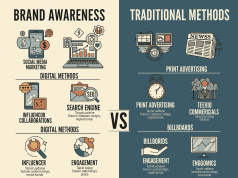The marketing technology (martech) landscape is evolving at an unprecedented pace. As businesses seek new ways to engage consumers, streamline operations, and drive growth, martech emerges as a crucial component in this transformation. Here are some key trends shaping the future of martech and how they’re revolutionizing the marketing industry.
1. AI and Machine Learning
Artificial intelligence (AI) and machine learning are not just buzzwords—they’re integral to the future of martech. These technologies allow marketers to analyze vast amounts of data quickly, enabling more informed decision-making.
- Predictive Analytics: Marketers can now use AI algorithms to predict customer behavior based on historical data, allowing for more personalized and relevant marketing strategies.
- Chatbots and Virtual Assistants: AI-powered chatbots are enhancing customer service by providing instant responses and 24/7 availability, leading to improved customer satisfaction.
2. Personalization at Scale
Personalization has become a cornerstone of effective marketing. Modern consumers expect tailored experiences, and marketers are leveraging advanced tools to meet these demands.
- Dynamic Content: Martech platforms can create dynamic content that changes based on user preferences, behaviors, and demographics, increasing engagement and conversion rates.
- Segmentation and Targeting: Enhanced audience segmentation tools enable marketers to target specific customer groups with tailored messaging, optimizing campaigns for better outcomes.
3. Integration of Data Sources
The future of martech lies in the seamless integration of various data sources. Businesses are collecting data from multiple channels—social media, website interactions, email marketing, and offline activities.
- Unified Customer View: Integrating these data points provides a holistic view of the customer journey, allowing for more effective marketing strategies and customer relationship management.
- Data-Driven Decision Making: Marketers can make more informed decisions based on comprehensive insights gathered from integrated data sources.
4. Omnichannel Marketing Strategies
Consumers move effortlessly across different channels, and businesses need to keep up. Omnichannel marketing ensures a cohesive customer experience across all touchpoints.
- Consistent Messaging: Tools that facilitate omnichannel marketing make it easier for brands to deliver consistent messaging, regardless of the platform.
- Improved Customer Experience: By providing a seamless transition from one channel to another, businesses enhance customer satisfaction and loyalty.
5. Content Automation and Optimization
As content marketing continues to be a pivotal strategy, automation tools are becoming essential for creating, managing, and optimizing content.
- AI-Driven Content Creation: AI tools can generate content and help marketers analyze which types resonate best with target audiences, freeing up time for more strategic tasks.
- SEO Optimization: Marketing technologies now incorporate SEO metrics, enabling marketers to optimize content for search engines effectively and driving more organic traffic.
6. Real-Time Analytics and Reporting
In a fast-paced digital landscape, real-time analytics are crucial for timely decision-making.
- Instant Feedback Loops: Marketers can quickly assess the performance of campaigns, allowing for agile adjustments and optimization to maximize ROI.
- Dashboard Tools: Modern martech solutions offer user-friendly dashboards that provide key performance indicators (KPIs), making it easier for teams to track success.
7. Privacy and Data Security
As regulations such as GDPR and CCPA come into play, data privacy will continue to be a significant concern for marketers.
- Compliance Tools: Martech companies are developing tools that help businesses comply with data regulations, thus building trust with customers.
- Ethical Marketing Practices: Marketers are encouraged to adopt ethical practices regarding customer data, which can enhance brand reputation and consumer trust.
Conclusion
The future of martech is defined by the intersection of technology and customer experience. As businesses look to compete in an ever-evolving landscape, embracing these trends will be essential. From AI-driven personalization to seamless data integration, the advancements in martech will shape the way marketers engage and inspire their audiences. By staying ahead of these trends, businesses can not only enhance their marketing strategies but also forge deeper connections with their customers in an increasingly complex digital world.









